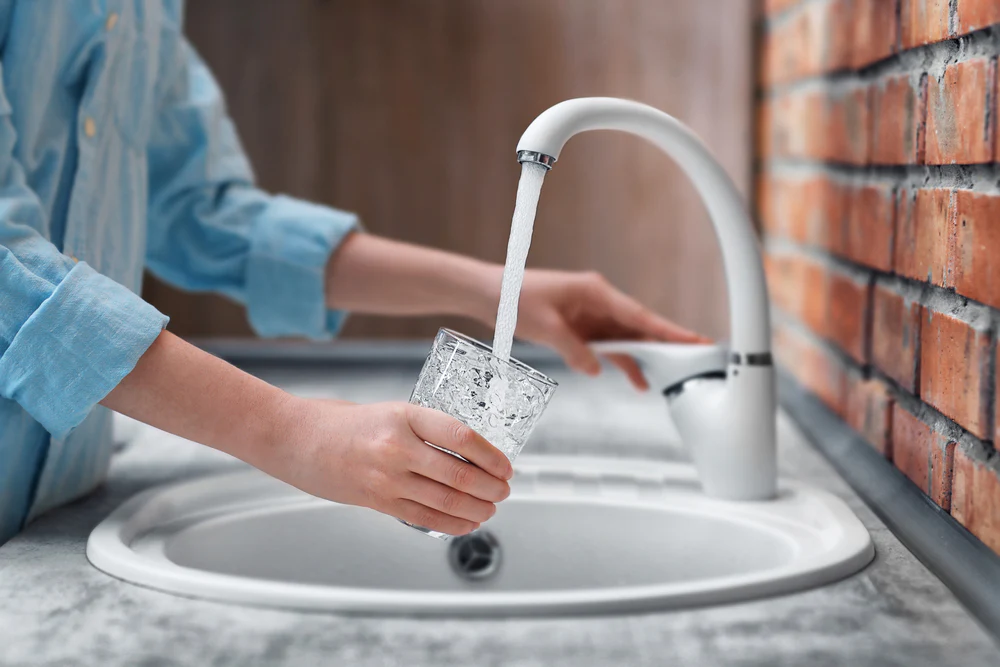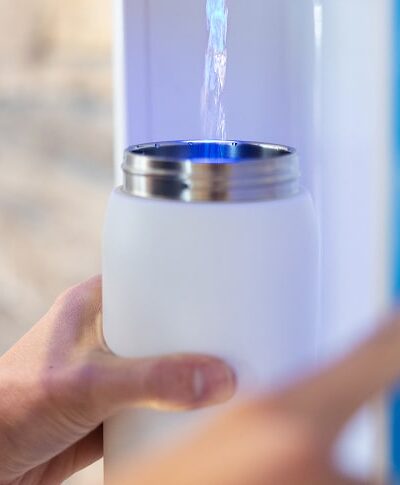For many, functioning without a morning cup of coffee may feel like an impossible feat. Coffee may be deemed an essential to jumpstart the day, but when comparing coffee vs. water, what’s better for employees? In short, water is a need and coffee is a want. Reaching for aluminum water bottles can provide fresh and clean water which is a great way to start your day. While both are beneficial to a productive workday, the advantage of being hydrated exceeds the perks that come from being caffeinated.
Although coffee may be a beverage that gets your employees going in the morning or makes them more alert in the afternoon, it’s better to invest in a water solution to keep them engaged and focused throughout the day. By comparing the health benefits of both, data shows how there’s room for both in a day, but ultimately, water wins out. After all, even though you may prefer hot coffee, you still need water to brew it.
Common Benefits of Coffee
Caffeine affects people in different ways. While decaffeinated is an option for those who enjoy the smell and taste of hot coffee, most drink it in an effort to wake up or stay alert. According to the Mayo Clinic, up to 400 milligrams of caffeine or roughly four cups of brewed coffee is safe for healthy adults on a daily basis. Keep in mind this amount is limited if you get your caffeine in other ways, like by drinking soda or sports drinks.
Some studies have shown that drinking brewed coffee improved problem-solving skills and also served as a mood booster, although this isn’t necessarily effective for everyone. If you’re a coffee drinker, you probably rely on it’s caffeine on a daily basis to give you a little pep in your step when you’re feeling tired. Research performed by Harvard Medical School concludes the reason you get a wake up call after your morning cup of coffee is because of the effects of caffeine on your brain.
It works as a brain stimulant and blocks receptors for adenosine which allows brain-sparking chemicals to flow more freely. As a result, you feel a surge of energy and for some, long-term memory improvement. However, with these productivity benefits comes a few drawbacks as well.
Negative Side Effects of Caffeine
People who are sensitive to the effects of caffeine may feel jittery rather than focused or experience headaches and a rapid heartbeat when drinking too much coffee. Additionally, drinking brewed coffee for a jolt in the afternoon may lead to insomnia, which negatively affects natural sleep cycles, and causes grogginess in the morning. Lack of sleep then results in lower productivity and attention levels, which may lead to the need for more hot or iced coffee, creating a cyclical effect that’s not necessarily a healthy one.
Furthermore, those who drink several cups of coffee per day may experience withdrawal symptoms, such as irritability and lack of focus, from lack of caffeine when they don’t meet their regular fix. Finally, caffeine may not cause dehydration, but it’s not as valuable at promoting hydration the way water does. When choosing between coffee vs. water, water provides the same concentration and health benefits of coffee, plus several more of its own.
Benefits of Water to Boost Employee Health and Wellness
There is a long list of health benefits associated with drinking water. One of the greatest benefits is how it can boost your energy. Data has shown that drinking water may activate the metabolism and increase energy levels. One study concluded that drinking 500 milliliters of water boosted metabolic rate by 30 percent in both women and men. Starting your day with a glass of water rather than a cup of coffee will give you the energy you need to start the day off right.
Second, staying hydrated by drinking water prevents fatigue. The general remedy for a minor cold is to get plenty of rest and consistently drink water throughout the day. Drinking at least eight glasses of water on a daily basis helps to sustain hydration, which improves alertness and energy. A busy work schedule can prevent this healthy habit from forming. According to a study conducted by the Centers for Disease Control and Prevention, only 22 percent of surveyed adults reported drinking eight cups or more a day.
Third, drinking water aids in cognitive function and improvements in the mood. According to data published by the National Library of Medicine National Center for Biotechnology Information, dehydration by even two percent impairs performance in tasks that require attention, immediate memory skills, and subjective assessments. During busy work days when breaks are few and far between, it’s easy to get dehydrated.
Boosted energy, fatigue prevention, and improvements to cognitive function and memory are only a few of the many benefits water provides. There are no drawbacks like with coffee or other caffeinated beverages to receive these perks, only natural advantages. Having access to an on-demand filtered water station in the office can help keep employees’ energy and concentration levels high and lead to improved productivity and overall better work performance.
Customer research shows FloWater, specifically, increases employee wellness by encouraging 76 percent of employees to drink more water and 54 percent reducing consumption of other beverages. A majority of employees may still drink a cup or two of coffee during the work day, but it’s likely they’ll drink far greater amounts of water, especially if it’s easily accessible. If you’re trying to keep employees healthy and energized, provide your team with a water filtration system.
Office Advantages of Investing in a Water Station Solution
In addition to the health benefits of water vs. coffee and the rise in productivity levels, investing in a water station solution is more convenient and sustainable. Coffee pots, latte machines, and other office coffee contraptions only meet the needs of a few at a time. For a larger organization, there may be a constant coffee shortage. Additionally, it becomes costly to continuously replenish a coffee supply.
Alternatively, the FloWater Refill Station is designed to meet the demands of high-capacity crowds with water on-demand at all times. Every time water is dispensed, it auto-replenishes to always have seven gallons of filtered, fresh water available for employee use. There is no shortage and concern over waiting for cold water to be ready again. The station transforms tap water to meet the hydration needs of any company size.
Second to employee convenience is environmental sustainability. Many offices have single-use coffee pods or use coffee filters made of unrecyclable materials. To keep employees hydrated, single-use plastic water bottles or large plastic jugs must be rotated out frequently. To limit the amount of office waste, the FloWater Refill Station provides a sustainable option that requires little to no maintenance. Plus, features such as sleep mode and LED lights keep operating costs low and adapt to changing headcounts for the actual number of people in the office.
Once installed, there’s no need to schedule deliveries, worry about shipment delays, or contribute to the increasing amount of plastic waste affecting the planet today. The dispensing area fits any size of water container and fills up a 24-oz. bottle in under 10 seconds. To clean the filtration system, all you have to do is wipe down the front panels. This alleviates the burden of ordering, cleaning, and maintaining associated with an office coffee supply while keeping your staff and visitors hydrated.
FloWater Wins as the Best In-Office Solution
Coffee will always be a part of a workday, but water is what everyone needs to function optimally. All employees need to stay hydrated whether or not coffee is available or enjoyed by all. The FloWater office water cooler provides health benefits, convenience, and sustainability, and tastes great, too. To encourage people to drink more water, it has to be cool and refreshing. The water station keeps water chilled to an optimal 42 degrees and is run through seven advanced water filtration stages.
First, sediment, tiny particles, and other contaminants are removed from the water. These include dust, rust, heavy metals, bacteria, and viruses, to name a few. Next, activated oxygen and alkaline and electrolyte enhancements are added to improve the taste and quality of the water. The activated oxygen process adds a third element of oxygen to the water to help improve its taste and make it available for your blood and muscles. This also works as a natural sanitizer for the tanks and internal system. The alkaline phase balances the pH level of tap water and neutralizes the acidity in the body, helping to alleviate stress from internal organs.
Electrolytes (potassium, sodium, calcium, and magnesium) are then added to the water to help with hydration and energy levels. Finally, the last level of filtration is the coconut carbon filter which is responsible for giving FloWater its crisp, delicious finish. By using real coconut husks to remove any lingering odors or tastes, it guarantees that your employees will be drinking the most purified, best-tasting water possible.
The refill station is a benefit for any office as a filtered water supply. This central source of hydration allows employees to fill up any size container, anytime they want. Plus, the water can be used to heat up soup, a cup of instant noodles, brew tea, and yes, even make coffee. Although the coffee vs. water conversation may be up for debate, everyone can agree that an on-demand purified water supply is a non-negotiable for any office environment.
Sources:
- https://www.mayoclinic.org/healthy-lifestyle/nutrition-and-healthy-eating/in-depth/caffeine
- https://www.healthline.com/health-news/coffee-improves-focus-but-wont-enhance-creativity
- https://www.health.harvard.edu/blog/caffeine-healthy-diet-may-boost-memory-thinking-skills-alcohols-effect-uncertain-201406187219
- https://www.healthline.com/health/food-nutrition/why-is-water-important
- https://www.medicalnewstoday.com/articles/290814#facts
- https://pubmed.ncbi.nlm.nih.gov/22855911/




